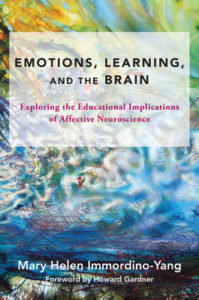 Public education exists, in part, to promote healthy human development. Therefore, our efforts to improve public education should be informed by the science of human behavior. Public education is most effective when its processes and systems are aligned with our best understandings of cognition, emotions, motivation, and learning.
Public education exists, in part, to promote healthy human development. Therefore, our efforts to improve public education should be informed by the science of human behavior. Public education is most effective when its processes and systems are aligned with our best understandings of cognition, emotions, motivation, and learning.
Hence, my enthusiasm for Mary Helen Immordino-Yang’s 2016 book, Emotions, Learning, and the Brain: Exploring the Educational Implications of Affective Neuroscience.
Immordino-Yang is a neuroscientist and former public-school teacher who uses brain mapping technology to better understand how our brains work. Her focus in this book is the relationship between emotions, cognition, and learning. Her key finding is that emotions and cognition are inseparable and interdependent. They are two sides of the same coin. Emotions motivate cognition, cognition impacts emotions, and learning is controlled by this symbiosis.
Learning is hard work. It requires purposeful information processing, including attending to information, applying information, evaluating information, and filing information in memory. This level of cognitive effort requires motivation and motivation derives from emotion (and cognition).
As Immordino-Yang writes:
It is literally neurobiologically impossible to build memories, engage complex thoughts, or make meaningful decisions without emotion … we only think about things we care about … without emotion, all decisions and outcomes are equal—people can have no preferences, no interests, no motivation, no morality, and no sense of creativity, beauty, or purpose … emotions are, in essence, the rudder that steers thinking.The implications for schools are simple to understand yet complex to implement. We need to help children learn to manage this interdependency between thinking and emotions so they can maximize the quality and quantity of their learning, and their overall development. This will require helping children develop a high level of emotional self-awareness and the cognitive skills to manage their emotions effectively, even as these emotions are impacting their cognition. Given that most adults struggle with emotional self-awareness and self-management, teaching these emotional and cognitive skills effectively in school and home will be a challenge.
“Metacognition” is the term psychologists use to refer to thinking about thinking. Immordio-Yang’s research suggest schools and parents need to do a much better job teaching students metacognitive skills.
While Immordio-Yang’s book contains little how-to information for teachers and parents, she has partnered with the Annenberg Foundation to create a website focused on helping teachers apply the latest cognitive neuroscience research in the classroom. The key theme on the website is the importance of student and teacher ownership. When teachers and students have a greater sense of ownership over their teaching and learning, respectively, they are more motivated to work hard and succeed. Choice promotes ownership, which is why Immordio-Yang encourages schools to empower teachers and students via greater choice in the classroom. She asserts that teachers should have more control over how they prepare and implement learning opportunities, and students should have more control over how they choose to learn.
I believe the larger education choice movement is aligned to these cognitive neuroscience findings. Empowering parents to choose the learning options that best meet their children’s needs leads to greater emotional engagement and commitment by the parents and students, which in turn leads to better results. When teachers, parents, and students own their choices, they are usually more successful than those who do not have this same sense of empowerment and control.
My last book review examined Jonathan Haidt’s The Righteous Mind. Haidt, a social psychologist, also explored the interdependency of emotions and cognition. While his focus was on moral and political decision-making, the neuroscience research Immordino-Yang reviews also helps explain how emotions and cognition interact to control our political and moral reasoning.
Haidt suggests that every political decision is grounded in emotions and tribal affiliations. We first come to an emotional conclusion about an issue, such as the virtues of education choice or the veracity of climate change, and then create arguments to support our emotional conclusions. Our tribal affiliations are important since our emotions and cognition generally conform to those of our tribe. The plethora of independent research and judicial decisions showing that Florida’s tax credit scholarship program does not negatively impact school district funding has no impact on teacher union leaders, whose tribe believes that it does. Likewise, no amount of objective science will convince most conservative Republicans that climate change is an environmental threat that warrants drastic policy interventions.
The power of tribalism and the emotions that derive from our tribal affiliations are why people from diverse backgrounds often have difficulty finding common political ground. A phenomenon that is being exacerbated by the emotional and cognitive political segregation that modern social media is enabling.
Immordino-Yang’s research also helps elucidate the many cognitive biases that have been identified by psychologists such as Daniel Kahneman and Amos Tversky and behavioral economist Richard Thaler. It’s the emotional basis of our cognition that allows us to be moral, creative, and motivated, but also, at times, irrational and highly susceptible to false assertions that align with our emotional biases.
Perhaps after we’ve taught a generation or two of children to be more aware of how their emotions and cognition are interacting to impact their thoughts, feelings, and behaviors (i.e., have better metacognitive skills), we’ll be better able to manage ourselves and our relations with others. Our democracy depends on it.


